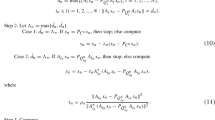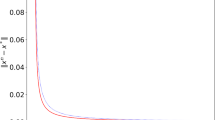Abstract
In this paper, we study the split feasibility problem with multiple output sets in Hilbert spaces. For solving the aforementioned problem, we propose two new self-adaptive relaxed CQ algorithms which involve computing of projections onto half-spaces instead of computing onto the closed convex sets, and it does not require calculating the operator norm. We establish a weak and a strong convergence theorems for the proposed algorithms. We apply the new results to solve some other problems. Finally, we present some numerical examples to show the efficiency and accuracy of our algorithm compared to some existing results. Our results extend and improve some existing methods in the literature.




Similar content being viewed by others
References
Censor, Y., Elfving, T.: A multiprojection algorithm using bregman projections in a product space. Numer. Algorithms 8(2), 221–239 (1994)
Byrne, C.: Iterative oblique projection onto convex sets and the split feasibility problem. Inverse Probl. 18(2), 441 (2002)
Censor, Y., Elfving, T., Kopf, N., Bortfeld, T.: The multiple-sets split feasibility problem and its applications for inverse problems. Inverse Probl. 21(6), 2071 (2005)
Censor, Y., Bortfeld, T., Martin, B., Trofimov, A.: A unified approach for inversion problems in intensity-modulated radiation therapy. Phys. Med. Biol. 51(10), 2353 (2006)
Censor, Y., Segal, A.: Iterative projection methods in biomedical inverse problems. Mathematical methods in biomedical imaging and intensity-modulated radiation therapy (IMRT) 10, 65–96 (2008)
Wang, J., Hu, Y., Li, C., Yao, J.-C.: Linear convergence of CQ algorithms and applications in gene regulatory network inference. Inverse Probl. 33 (5), 055017 (2017)
Ansari, Q. H., Rehan, A.: Split feasibility and fixed point problems. In: Nonlinear Analysis, Springer, pp. 281–322 (2014)
Xu, H.-K.: Iterative methods for the split feasibility problem in infinite-dimensional hilbert spaces. Inverse Probl. 26(10), 105018 (2010)
Byrne, C.: A unified treatment of some iterative algorithms in signal processing and image reconstruction. Inverse Probl. 20(1), 103 (2003)
Takahashi, W.: The split feasibility problem and the shrinking projection method in banach spaces. J. Nonlinear Convex Anal. 16(7), 1449–1459 (2015)
Xu, H.-K.: A variable krasnosel’skii–mann algorithm and the multiple-set split feasibility problem. Inverse Probl. 22(6), 2021 (2006)
Yang, Q.: The relaxed CQ algorithm solving the split feasibility problem. Inverse Probl. 20(4), 1261 (2004)
Gibali, A., Mai, D. T., et al.: A new relaxed CQ algorithm for solving split feasibility problems in hilbert spaces and its applications. J. Ind. Manag. Optim. 15(2), 963 (2019)
Sahu, D.R., Cho, Y.J., Dong, Q.L., Kashyap, M.R., Li, X.H.: Inertial relaxed CQ algorithms for solving a split feasibility problem in hilbert spaces. Numer. Algorithms 1–21 (2020)
López, G., Martín-Márquez, V., Wang, F., Xu, H.-K.: Solving the split feasibility problem without prior knowledge of matrix norms. Inverse Probl. 28(8), 085004 (2012)
He, S., Zhao, Z.: Strong convergence of a relaxed CQ algorithm for the split feasibility problem. J. Inequal. Appl. 2013(1), 197 (2013)
Yao, Y., Postolache, M., Liou, Y.-C.: Strong convergence of a self-adaptive method for the split feasibility problem. Fixed Point Theory and Applications 2013(1), 201 (2013)
Dang, Y., Sun, J., Xu, H.: Inertial accelerated algorithms for solving a split feasibility problem. Journal of Industrial and Management Optimization 13(3), 1383–1394 (2017)
Gibali, A., Liu, L.-W., Tang, Y.-C.: Note on the modified relaxation CQ algorithm for the split feasibility problem. Optim. Lett. 12(4), 817–830 (2018)
Zhang, W., Han, D., Li, Z.: A self-adaptive projection method for solving the multiple-sets split feasibility problem. Inverse Probl. 25(11), 115001 (2009)
Zhao, J., Yang, Q.: A simple projection method for solving the multiple-sets split feasibility problem. Inverse Probl. Sci. Eng. 21(3), 537–546 (2013)
López, G., Martin, V., Xu, H.K., et al.: Iterative algorithms for the multiple-sets split feasibility problem. Biomed. Math.: Promising Directions in Imag, Therapy Planning Inverse Problems 243–279 (2009)
Dang, Y.-, Yao, J., Gao, Y.: Relaxed two points projection method for solving the multiple-sets split equality problem. Numer. Algorithms 78 (1), 263–275 (2018)
Iyiola, O.S., Shehu, Y.: A cyclic iterative method for solving multiple sets split feasibility problems in banach spaces. Quaest. Math. 39(7), 959–975 (2016)
Shehu, Y.: Strong convergence theorem for multiple sets split feasibility problems in banach spaces. Numer. Funct. Anal. Optim. 37(8), 1021–1036 (2016)
Suantai, S., Pholasa, N., Cholamjiak, P.: Relaxed CQ algorithms involving the inertial technique for multiple-sets split feasibility problems. Revista de la Real Academia de Ciencias Exactas, Físicas y Naturales. Serie A. Matemáticas 113(2), 1081–1099 (2019)
Wang, J., Hu, Y., Yu, C. K. W., Zhuang, X.: A family of projection gradient methods for solving the multiple-sets split feasibility problem. J. Optim. Theory Appl. 183(2), 520–534 (2019)
Mewomo, O.T., Ogbuisi, F.U.: Convergence analysis of an iterative method for solving multiple-set split feasibility problems in certain banach spaces. Quaest. Math. 41(1), 129–148 (2018)
Buong, N., Hoai, P. T. T., Binh, K. T.: Iterative regularization methods for the multiple-sets split feasibility problem in hilbert spaces. Acta Appl. Math. 165(1), 183–197 (2020)
Yao, Y., Postolache, M., Zhu, Z.: Gradient methods with selection technique for the multiple-sets split feasibility problem. Optimization (2019)
Wang, X.: Alternating proximal penalization algorithm for the modified multiple-sets split feasibility problems. J. Inequal. Appl. 2018(1), 1–8 (2018)
Taddele, G. H., Kumam, P., Gebrie, A. G., Sitthithakerngkiet, K.: Half-space relaxation projection method for solving multiple-set split feasibility problem. Math. Comput. Appl. 25(3), 47 (2020)
Taddele, G. H., Kumam, P., Gebrie, A. G.: An inertial extrapolation method for multiple-set split feasibility problem. J. Inequal. Appl. 2020 (1), 1–22 (2020)
Sunthrayuth, P., Tuyen, T. M.: A generalized self-adaptive algorithm for the split feasibility problem in banach spaces. Bull. Iran. Math. Soc. 1–25 (2021)
Censor, Y., Segal, A.: The split common fixed point problem for directed operators. J. Convex Anal 16(2), 587–600 (2009)
Moudafi, A.: The split common fixed-point problem for demicontractive mappings. Inverse Probl. 26(5), 055007 (2010)
Censor, Y., Gibali, A., Reich, S.: Algorithms for the split variational inequality problem. Numer. Algorithms 59(2), 301–323 (2012)
Byrne, C., Censor, Y., Gibali, A., Reich, S.: The split common null point problem. J. Nonlinear Convex Anal 13(4), 759–775 (2012)
Tuyen, T. M., Ha, N. S., Thuy, N. T. T.: A shrinking projection method for solving the split common null point problem in banach spaces. Numer. Algorithms 81(3), 813–832 (2019)
Reich, S., Tuyen, T. M.: Two projection algorithms for solving the split common fixed point problem. J. Optim. Theory Appl. 186(1), 148–168 (2020)
Reich, S., Tuyen, T. M.: Two new self-adaptive algorithms for solving the split common null point problem with multiple output sets in hilbert spaces. J. Fixed Point Theory Appl. 23(2), 1–19 (2021)
Reich, S., Tuyen, T. M.: Projection algorithms for solving the split feasibility problem with multiple output sets. J. Optim. Theory Appl. 190(3), 861–878 (2021)
Reich, S., Truong, M. T., Mai, T. N. H.: The split feasibility problem with multiple output sets in hilbert spaces. Optim. Lett 1–19 (2020)
Bauschke, H. H., Combettes, P. L., et al.: Convex analysis and monotone operator theory in hilbert spaces, vol. 408. Springer, Berlin (2011)
Goebel, K., Simeon, R.: Uniform convexity, hyperbolic geometry, and nonexpansive mappings. Dekker (1984)
Opial, Z.: Weak convergence of the sequence of successive approximations for nonexpansive mappings. Bull. Am. Math. Soc. 73(4), 591–597 (1967)
Rockafellar, R. T.: Monotone operators and the proximal point algorithm. SIAM journal on control and optimization 14(5), 877–898 (1976)
Cholamjiak, P., Suantai, S., et al.: A new CQ algorithm for solving split feasibility problems in hilbert spaces. Bull. Malays. Math. Sci. Soc. 42 (5), 2517–2534 (2019)
Maingé, P.-E.: Strong convergence of projected subgradient methods for nonsmooth and nonstrictly convex minimization. Set-Valued Analysis 16(7-8), 899–912 (2008)
Xu, H.-K.: Iterative algorithms for nonlinear operators. J. Lond. Math. Soc. 66(1), 240–256 (2002)
Fukushima, M.: A relaxed projection method for variational inequalities. Math. Program. 35(1), 58–70 (1986)
Reich, S., Tuyen, T. M.: Iterative methods for solving the generalized split common null point problem in hilbert spaces. Optimization 69(5), 1013–1038 (2020)
Reich, S., Tuyen, T. M., Ha, M. T. N.: An optimization approach to solving the split feasibility problem in hilbert spaces. J. Glob. Optim 1–16 (2020)
Cegielski, A.: Iterative methods for fixed point problems in hilbert spaces, vol. 2057. Springer, Berlin (2012)
Jeffs, B. D., Gunsay, M.: Restoration of blurred star field images by maximally sparse optimization. IEEE Trans. Image Process. 2(2), 202–211 (1993)
Fevrier, I. J., Gelfand, S. B., Fitz, M. P.: Reduced complexity decision feedback equalization for multipath channels with large delay spreads. IEEE Trans. Commun. 47(6), 927–937 (1999)
Duttweiler, D. L.: Proportionate normalized least-mean-squares adaptation in echo cancelers. IEEE Transactions on speech and audio processing 8(5), 508–518 (2000)
Ramsey, J. B., Zhang, Z.: The application of wave form dictionaries to stock market index data. In: Predictability of complex dynamical systems, Springer, pp. 189–205 (1996)
Halmos, P. R.: A hilbert space problem book. Springer-Verlag, New York (1982)
Acknowledgements
The authors acknowledge the financial support provided by the Center of Excellence in Theoretical and Computational Science (TaCS-CoE), KMUTT. Guash Haile Taddele is supported by the Petchra Pra Jom Klao Ph.D. Research Scholarship from King Mongkut’s University of Technology Thonburi (Grant No.37/2561). Moreover, we would like to thank the Editor and Reviewers for taking the time and effort necessary to review the manuscript. We sincerely appreciate all valuable comments and suggestions, which helped us to improve the quality of the manuscript.
The authors acknowledge the financial support provided by “Mid-Career Research Grant” (N41A640089).
Funding
This research was funded by the Center of Excellence in Theoretical and Computational Science (TaCS-CoE), Faculty of Science, KMUTT. The first author was supported by the Petchra Pra Jom Klao Ph.D. Research Scholarship from King Mongkut’s University of Technology Thonburi with Grant No. 37/2561.
Author information
Authors and Affiliations
Corresponding author
Ethics declarations
Competing interests
The authors declare no competing interests.
Additional information
Author contribution
All authors contributed equally to the manuscript and read and approved the final manuscript.
Availability of data and material
Not applicable.
Code availability
Not available.
Publisher’s note
Springer Nature remains neutral with regard to jurisdictional claims in published maps and institutional affiliations.
Rights and permissions
About this article
Cite this article
Taddele, G.H., Kumam, P., Sunthrayuth, P. et al. Self-adaptive algorithms for solving split feasibility problem with multiple output sets. Numer Algor 92, 1335–1366 (2023). https://doi.org/10.1007/s11075-022-01343-6
Received:
Accepted:
Published:
Issue Date:
DOI: https://doi.org/10.1007/s11075-022-01343-6
Keywords
- Split feasibility problem
- Split feasibility problem with multiple output sets
- Hilbert space
- Relaxed CQ algorithm
- Self-adaptive technique




